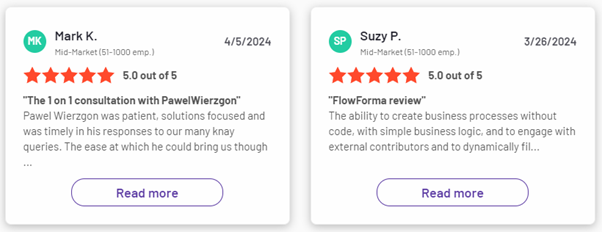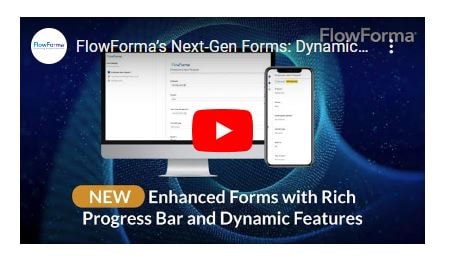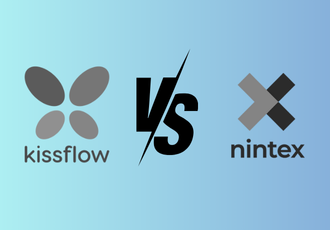Selecting a business automation platform is not that different from picking your next vehicle. The array of choices can be confusing. What have you already have vs. what you need. What you get with one may be missing in the other. Budget considerations are at play and features and capabilities can vary considerably.
Like cars, it is a considerable investment (even if opting for the lower price bracket), so time must be spent weighing up the pros and cons of each business process automation platform to establish what’s best for you and your organization.
What is Business Automation Software?
There are buyer guides that you can refer to and useful starter kits available however business automation tools evolve, and keeping up with different product roadmaps is no walk in the park.
When you have the right business automation platform, task scheduling, customer satisfaction and organizational efficiency is easy, but different organizations have different needs, skill sets, and budgets.
Different providers have varying levels of customer support, lots of price bands, not to mention coded, low code and no code functionality. Some are pure robotic process automation solutions not to be confused with business process automation software.
Whether starting from scratch, complimenting your existing tech stack, or replacing legacy business automation systems, you will want to be armed with some high-level info to separate the wheat from the chaff.
Benefits of Business Automation Software
Business automation software is a game-changer for organizations looking to streamline operations and boost productivity. Below are some of the benefits of using a Business Automation software
-
Increased Efficiency: Automates repetitive tasks, saving time and reducing errors.
-
Enhanced Accuracy: Delivers consistent, error-free outputs.
-
Better Resource Allocation: Frees employees for strategic tasks, driving innovation.
-
Improved Process Visibility: Offers real-time workflow insights for better decision-making.
-
Cost Savings: Reduces manual effort and minimizes errors, cutting costs.
Key Factors to Consider When Choosing Business Automation Software
Selecting the right business automation software is critical to achieving the desired impact. Understanding the below key factors, and integration capabilities ensures you choose a solution that meets your organization’s needs.
-
Ease of Use: Prioritize user-friendly platforms for quick adoption.
-
Scalability: Ensure the software grows with your business needs.
-
Customization: Look for tools that adapt to your unique workflows.
-
Integration Capabilities: Opt for software that integrates seamlessly with existing systems.
-
Cost-Effectiveness: Balance features and pricing for long-term value.
Now, Let’s look at what’s out there today and evaluate the business automation tools side-by-side.
Top 10 Business Process Automation Companies in 2025
With so many Analyst reports and online technology review sites, it can be a minefield working out the best business process automation software.
Let’s look under the hood of the top 10 in my mind and decipher some of the advantages and disadvantages of each.
1. FlowForma

FlowForma Process Automation is an enterprise-class, no code business process automation platform that empowers process owners to digitalize simple and complex business processes, at speed.
With 300,000+ users globally, and a highly skilled team of business process management, automation, workflow, and digital transformation experts FlowForma is dedicated to providing intuitive and affordable process automation tools enabling businesspeople to work smarter and faster.
Key Features
The all-in-one tool integrates forms, workflow automation, document generation, and analytics making automating business processes a dream. With various common processes available in adaptable out-of-the-box templates, organizations like how the tool can accelerate their digital transformation initiatives immediately and go live with one or more processes within hours.
.png?width=338&height=311&name=FlowForma%20DPA%204-in-1%20Graphic%20(2).png)
The FlowForma Business Process Automation Software allows process owners to automate repetitive tasks by introducing workflow automation. Business and IT users can simplify complex business processes, scale fast, and automate tasks.
The FlowForma business process automation software also offers a wide range of integration capabilities. With 16 integration rules (including integration with the Microsoft Connector framework, which supports 500+ applications), and a FlowForma REST API no-code integration that integrates with thousands of apps that provide REST API's there is no need to replace systems that work, but rather complement them.
The FlowForma workflow automation tool enables teams across any enterprise to streamline business operations.
Pricing
FlowForma’s pricing model is simple and easy to understand. Pricing starts at $7 per user per month for unlimited processes.
Pros and Cons
**Below review is from G2
What do you like best about FlowForma Process Automation?
"Pawel Wierzgon was patient, solution-focused and was timely in his responses to our many many queries. The ease at which he could bring us through the process and allowed us to look at how best to implement this system into our existing SharePoint.
He also identified features we did not know existed in Flowforma which will allow us to roll this form out to all employees to use on an annual basis. The ease of integration was excellent, and we aim to now transition all our forms to Flowforma."
What do you dislike about FlowForma Process Automation?
"The look and feel is still an issue of mine. I know the new look and feel is going live shortly, so hope that our current forms can transition across once this is launched."
What problems is FlowForma Process Automation solving, and how is that benefiting you?
"Currently, we have paper PDR forms which is cumbersome and time-consuming to process. With leaving this process it will allow managers to centralize all documents into a central forum and for new managers to be able to access historical PDRs to review the performance of existing employees."

What's on the FlowForma Product Roadmap?
FlowForma announced an impending upgrade to its workflow automation platform which promises to inject a range of innovative features to enhance user experience and streamline workflow management.
The focus of the new release hinges on enhancing FlowForma Forms with a new process tracker which promises to enhance task management and revolutionize how business users interact with and manage processes.

Key highlights of the forms upgrade due for gradual release from April 2024 include:
-
New process tracker
-
Mobile-friendly enhancements
-
Feedback feature
-
Modern look and feel
-
Technical advancements

Another key product enhancement is its new AI-powered process automation features. FlowForma recently released Copilot and AI summarization that accelerates process automation, productivity gains, and operational excellence. Learn more about the new Copilot in this video here.
2. Microsoft Power Automate & Power Apps

What is Power Automate?
Microsoft Power Automate is another cloud-based platform which is primarily an automation and integration tool. It uses AI and low-code to automate and streamline critical processes. Its automation capabilities allows users to create workflows that automate daily tasks across applications and services.
If you have repetitive tasks Power Automate helps you to take care of this. A Power Automate process may help you to create simple notifications e.g. perhaps a flow that is created to send you a daily reminder but Power Automate can also be used to create more complex workflows.
Power Automate is an individual Microsoft product which can be integrated with Microsoft Power Apps.
What is Power Apps?
You will often hear Power Automate and Power Apps mentioned in the same sentence and that is because they can be combined.
Power Apps is a low code design tool for forms. I talk about both Microsoft products at length in another recent blog 'Power Apps Vs Power Automate Alternatives for Digitization'.
The product is described as low-code and has drag-and-drop functionality along with AI features to build forms. It is designed for business users and developers.
Features
- Canvas apps
- Model-driven apps
- Portals
- App creation
- App management
- Workflow automation
- Data and integration management
- Data security and compliance
- Artificial intelligence (AI Builder)
Pricing
Power Apps: From $12 per user per month
Power Automate: From $15 per user per month
Pros and Cons
Power Apps and Power Automate, like any business automation tool, has its advantages and disadvantages. The pros won't be a surprise, with both being Microsoft products they are aesthetically pleasing. The business process automation tool has a polished user-friendly interface and a certain familiarity that users are drawn too.
On the flip side, while the products are marketed as low code, business users or process owners often comment that they don't necessarily do exactly what's said on the tin and the IT team are called upon frequently to 'finish off' the coding element required to achieve the automated workflows desired.
G2 and other technology review sites are good repositories of user reviews. Below is a snapshot of the high level pros and cons of Power Apps

3. Nintex

Another Business process automation software tool is Nintex. Nintex is a low code process management and automation software tool that allows you to automate and optimize business processes and workflows.
Features:
- Forms
- Workflow
- Document generation
- eSignatures
- Robotic process automation (RPA)
- Process discovery technology
- Process management
Pricing
Nintex pricing starts at $25,000 USD /year for its basic package. Included in the cost:
- Unlimited users
- Unlimited Workflow Automation
- 2,000 document generations
- Forms
- Mobile App
- Premium Connectors
- Analytics
- eSign
- Standard 8 x 5 support
- Enhanced support
Pros and Cons
According to the G2 technology review site out of 1,021 reviews the following pros and cons were identified:

Nintex pricing models indicate that you get unlimited users and workflows with their premium package but document generation does have a cap.
Reviews can be mixed when it comes to customer support with some sources indicating that users have to rely on third-party resellers for assistance.
As it is a low code tool there is a reliance on IT development due to some complexities making ROI and scalability difficult to estimate.
4. Kissflow

Kissflow is another contender in the mix of business process automation tools and joins the various low code business process automation software options available on the market.
Pitched as enabling business users and IT professionals to automate business processes and accelerating digital transformation, like its competing business process automation tools it allows different business personas to automate tasks.
Features
- App Builder
- Boards
- Process Builder
- Form Builder
- Reporting & Analytics
- Collaboration
- Integrations
- External Portals
- Governance
Pricing
Basic pricing starts at $1,500/month with limited features including simple use cases and internal users.
Pros and Cons
G2, TrustRadius, Capterra, and various analyst reports are a useful source for reviews on all Business Process Automation software vendors.
A snapshot of G2 reviews indicates what users like and dislike about the Kissflow business automation software.

Many software vendors in the business process automation arena claim that their tool is suitable for non-technical business users implementing workflow automation however some Kissflow limitations like difficulty in reusing tasks; limited flexibility in the user interface; and the learning curve experienced when transitioning from paper-based processes may encourage you to explore no code options if coding skills are limited within your organization or if you need to reduce the reliance on your IT team.
5. Appian

Let's look at Appian. Appian is a business process management option. The Appian Process Management platform allows you to design, automate, and optimize manual tasks.
Originally regarded as an enterprise-level Business Process Management (BPM) vendor, Appian today identifies as a low-code application platform.
Features
- Process orchestration and automation
- Data fabric
- AI
- BringProcess intelligence
Pricing
Pricing starts at $75.00 per user per month.
Pros and Cons
Online G2 reviews of Appian compliment the business process automation platform for its ‘ease of use’ and 'fast development' with cons including 'limited features' and 'expensive'.

The 'Digital Process Automation Software, Q4 2023' Forrester Wave report, mentioned Appian's leadership and long-term technical vision but called out pricing clarity, flexibility, and transparency as the negative considerations.
6. Process Maker

Process Maker is one of the leading software solutions for business process automation. It highlights it's AI-powered features to the fore, promoting a future-first direction.
Features
- Intelligent Process Automation
- Seamless Integration
- Intelligent Document Processing (IDP)
- Generative AI
Pricing
Process Maker offers Standard, Professional, and Enterprise pricing. The exact pricing is hidden from public view on its website.
Pros and Cons

Users have commented that integrations are one of the stand-out features of the platform. HubSpot and BigCommerce are two external platforms known for their seamless integration with Process Maker.
Customers have reported that the user interface design needs to be improved to help speed up onboarding with new users. It enables non-technical users to quickly familiarize themselves with the features and functionality through more intuitive navigation components.
7. Decisions

Decisions is a business process automation software that companies AI tools, rules engines, and workflow management.
Features
- Rules Engine
- Codify business logic and automate decisions.
- Workflow Manager
- Create and refine processes. Sequence people and systems.
- Process Mining
- Integrations
- Connect systems and unify operations.
- Interfacing & Reporting
- Interface Designers
- Design seamless experiences.
- Build robust reports
Pricing
Decisions offer three tiers of pricing:
- BRONZE: Starting at $6,750 / month
- SILVER: Pricing not listed
- GOLD: Pricing not listed
Pros and Cons

The customer consensus is that the platform is relatively easy to use as it's a visually strong platform.
That said, customers have highlighted that the learning curve is very steep due to the multiple features and functionality available.
8. Pipefy
Pipefy is a business process automation provider with specialist features for HR and procurement.
Features
- Shareable fields, forms, and portals
- Internal forms for Pipefy users
- Emails to specific addresses
- Connection between processes
- Integration with other tools
- Customized solutions through our public API
Pricing
Pipefy offers three tiers of pricing:
- Starter: Free
- Business: Published pricing not available
- Enterprise: Published pricing not available
Pros and Cons

Users report that the platform is designed with a user-friendly interface. This makes for good usability, improved project management, and fast onboarding. Information is clearly sign-posted and easy to understand. It makes project management easy and requires very little learning to get onboarded
Customers have reported that the reporting feature needs to be improved so that data is more easily available and data analysis is faster.
9. CFlow

cFlow is a business process automation software designed for procurement, IT, HR, finance, sales and marketing use cases.
Features
- Drag & Drop Form Builder
- Routing & Notifications
- Customizations
- Reports & Analytics
- Rules Engine
- Secure Data
Pricing
CFlow offers three tiers of pricing:
- Happy: $7 /user/mo
- Joy: $11 /user/mo
- Bliss: $16 /user/mo
Pros and Cons

Cutomers have highlighted that the platform is easily customizable and can be tailored for multiple business processes.
Users have noted performance issues with the platform that slow down the pace of automation.
10. Bizagi

Bizagi is a low code platform designed for both app development and business process automation.
Features
- Artificial Intelligence
- End-to-End Automation
- Enterprise Orchestration
- Low-Code Apps
Pricing
Bizagi offers three tiers of pricing. But, the exact costs are hidden from public view on the website.
- Start Small and Scale
- Shared Success
- Unlimited Users & Apps
Pros and Cons

Customers have highlighted the online learning portal as one of the stand-out features of the software.
The e-learning streamlines user onboarding, assists with troubleshooting technical issues, and simplifies the overall use of the software.
Some users have noted that the platform demands advanced coding knowledge, resulting in certain projects being outsourced to third parties with the necessary expertise. This obviously would incur additional fees outside of the Bizagi subscription costs.
Features to Check Before Buying BPA Software
Going back to the new vehicle analogy. It's never easy to select a new car for yourself, never mind a new technology solution for your organization. What works for one organization might not necessarily tick all the boxes for another.
Quite often it can boil down to skill, budget, and time.
Restricted Skillset
 If you have minimal IT skills in your business a no code tool is advised as there will be little to no dependency on your IT department and it fosters a culture of innovation, empowering process owners to map out their workflow automation wish lists and gives them the autonomy to start automating business processes.
If you have minimal IT skills in your business a no code tool is advised as there will be little to no dependency on your IT department and it fosters a culture of innovation, empowering process owners to map out their workflow automation wish lists and gives them the autonomy to start automating business processes.
Budget Restrictions
You may be fortunate to have a substantial budget to work with or alternatively tasked with cutting costs because of budget cuts and historically expensive legacy systems that don't quite cut it. Available budget will play a huge part in your decision-making process.
Regardless of the size of budget, you will want to ensure that your initial outlay and future costs are transparent with no unexpected surprises. Consider the pricing models of each workflow automation vendor and look for one that offers the best value for money.
Time Restriction
If you are looking to scale fast you will want a process automation tool that offers workflow automation within weeks rather than months. You will be keen to automate repetitive tasks quickly and prove ROI early in your business automation software rollout.

Conclusion
When talking to Business and IT professionals tasked with selecting a tool for automating business processes, I always highly recommend taking a free trial or requesting a no-obligation demo as it really is the only way to see the tool in action and allow you to try before you buy.
Have a checklist, and score each vendor on their benefits and features. Ask how soon you can be up and running. Think of your biggest pain point and ask each vendor how they can help you streamline that process and gain efficiencies quickly.
It's really that simple.
Request your Free Trial or Demo today.
.png)
.png)
.png)
.png)
.png)
.jpg) By
By 




